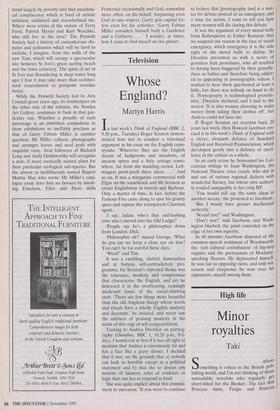Television
Whose England?
Martyn Harris
In last week's Think of England (BBC 2, 9.30 p.m., Tuesday) Roger Scruton demon- strated how not to conduct a televisual argument in his essay on the English coun- tryside. 'Wherever they are the English dream of hedgerows and meadows, of ancient spires and a little cottage some- where, far from the madding crowd. Left- wingers pooh-pooh these ideas.. . . ' And so on. It was a margarine commercial with Elgar on the soundtrack and Mr Scruton as ersatz Englishman in tweeds ad Barbour. Only a matter of time, in fact, before the Famous Five came along to spot his granny specs and expose this transparent Cherman agent.
'I say, Julian, who's that odd-looking cove who's moved into the Old Lodge?'
'People say he's a philosopher down from London, Dick.'
Philosopher eh?' mused George. 'What do you say we keep a close eye on him? You can't be too careful these days.'
'Woof!' said Tim.
It was a rambling, cliched, humourless and at bottom self-contradictory pro- gramme, for Scruton's repeated theme was the tolerance, modesty and compromise that characterise the English, and yet he delivered it in the overbearing, raspingly intolerant tones of the social-climbing snob. 'There are few things more beautiful than the old Anglican liturgy whose words and rituals have a wholly English modesty and decorum,' he insisted, and never saw the oddness of praising modesty in the midst of this orgy of self-congratulation.
Turning to Andrea Dworkin on pornog- raphy (Omnibus, BBC 1, 10.20 p.m., Fri- day), I wondered at first if it was all right to mention that Andrea is enormously fat and has a face like a gravy dinner. I decided that it was, on the grounds that a) nobody can look so horrible except as a political statement and b) that she so abuses any notions of fairness, rules of evidence or logic that one has to respond in kind.
She was quite explicit about this commit- ment to unreason: 'If you want to continue to believe that [pornography law] is a mat- ter for debate instead of an emergency, and a time for action, I want to tell you how many women will die during this debate.'
It was the argument of every moral bully from Robespierre to Esther Rantzen: that we suspend our reason in the face of social emergency, which emergency it is the sole right of the moral bully to define. So Dworkin presented us with a series of gormless hick prostitutes, who all testified to having been buggered by their grandfa- thers as babies and therefore being addict- ed to appearing in pornographic videos. wanted to hear them questioned at least a little, but there was nobody on hand to do it. 'Pornography is technologised prostitu- tion,' Dworkin declared, and I said to the screen, 'It is also women choosing to make money from taking their clothes off, but Andrea could not hear me.
If Roger Scruton set reaction back 20 years last week, then Howard Jacobson res- cued it in this week's Think of England with a clever, eloquent defence of Standard English and Received Pronunciation, which developed gently into a defence of excel- lence in the culture as a whole.
In an early scene he bemoaned his Lan- castrian whinge to Joan Washington, the National Theatre voice coach, who slid in and out of various regional dialects with wonderful fluency, but whose own authori- ty resided unarguably in her crisp RP.
'You would still say the same ideas in another accent,' she protested to Jacobson. 'But I would have greater intellectual authority.'
'Would you?' said Washington.
'Don't you?' said Jacobson, and Wash- ington blushed, the point conceded on the edge of her own asperity.
In 40 minutes Jacobson disposed of the common-speech sentiment of Wordsworth, the 'rich cultural contribution' of hip-hop rappers and the pretensions of Mockney- speaking Sloanes. He deprecated himself, he was fair to opposing views, and with wit, reason and eloquence he won over his opponents, myself among them.


































































 Previous page
Previous page